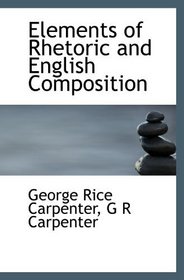Search -
Elements of Rhetoric and English Composition
Elements of Rhetoric and English Composition
Author:
Purchase of this book includes free trial access to www.million-books.com where you can read more than a million books for free. This is an OCR edition with typos. Excerpt from book: CHAPTER II COMPOSITIONS 9. The Importance Of Composition Work. —10. How To Choose A Subject. —11. Subjects From The Course In EngLish Literature. — 12. Sub... more »
Author:
Purchase of this book includes free trial access to www.million-books.com where you can read more than a million books for free. This is an OCR edition with typos. Excerpt from book: CHAPTER II COMPOSITIONS 9. The Importance Of Composition Work. —10. How To Choose A Subject. —11. Subjects From The Course In EngLish Literature. — 12. Sub... more »
ISBN-13: 9781113929167
ISBN-10: 1113929162
Publication Date: 9/20/2009
Pages: 274
Rating: ?
ISBN-10: 1113929162
Publication Date: 9/20/2009
Pages: 274
Rating: ?
0 stars, based on 0 rating
Publisher: BiblioBazaar
Book Type: Paperback
Other Versions: Hardcover
Members Wishing: 0
Reviews: Amazon | Write a Review
Book Type: Paperback
Other Versions: Hardcover
Members Wishing: 0
Reviews: Amazon | Write a Review




